US correspondent Thomas May reports on Music on the Strait, an intimate chamber music festival that takes place each summer on Washington’s scenic Olympic Peninsula
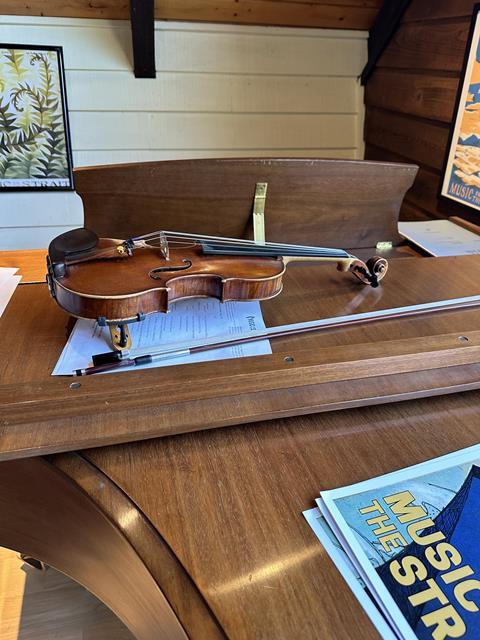
Discover more Featured Stories like this in The Strad Playing Hub
If you set out west from Seattle across Puget Sound – take one of the ferry lines for a more local experience – the Olympic Peninsula beckons with an abundance of natural wonders, historic towns and musical surprises.
All of these converge in Port Angeles, gateway to Olympic National Park and the peninsula’s main urban center. It’s well worth making the trip there in late summer to catch Music on the Strait (MOTS), a chamber music festival co-founded in 2018 and jointly led by violinist James Garlick and violist Richard O’Neill.
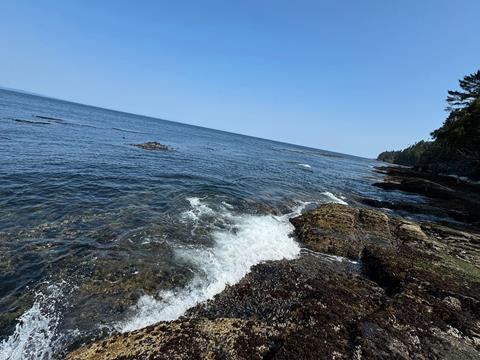 Strait of Juan de Fuca; photo (c) Jorge Gustavo Elias
Strait of Juan de Fuca; photo (c) Jorge Gustavo Elias
The festival’s name refers to the Strait of Juan de Fuca, part of the Salish Sea running between the US and Canada, which, Garlick notes, ‘connects our countries and our communities’.
Between concerts, it’s easy to schedule quick trips to nearby highlights like Hurricane Ridge (which commands truly Olympic views), the Elwha River ecosystem restoration site or Port Townsend, a quaint seaport that charms with Victorian architecture and that also happens to be a centre for the archetier’s art.
Typically offering four separate programmes spread over two weekends, MOTS attracts world-class artists to this breathtakingly beautiful corner of the Pacific Northwest, such as Jeremy Denk (a regular favourite), Garrick Ohlsson or O’Neill’s fellow Takács Quartet members.
The programming aims for a thoughtful mix of repertoire and discovery. I was able to attend both concerts on Weekend Two of MOTS (9–10 August), each of which featured a piece by Kronos Quartet cellist Paul Wiancko, composer-in-residence of the 2024 festival. Wiancko also participated as a performer.
Because of his particularly busy tour schedule with Takács, the Grammy Award-winning O’Neill was available to perform at only one MOTS concert this year – happily, during the weekend I was there. The concert took place at the tiny but handsome 130-seat Maier Hall at Peninsula College. Its intimacy and warm acoustics are well-suited to chamber performance.
Appearing in solo, duo and trio formations, O’Neill served as the anchor for the programme. He began with a soul-searching interpretation of Bach’s C major Cello Suite arranged for viola and, joined by Wiancko, proceeded to the latter’s American Haiku for viola and cello (2014), an appealing, far-traveling search for musical identity.
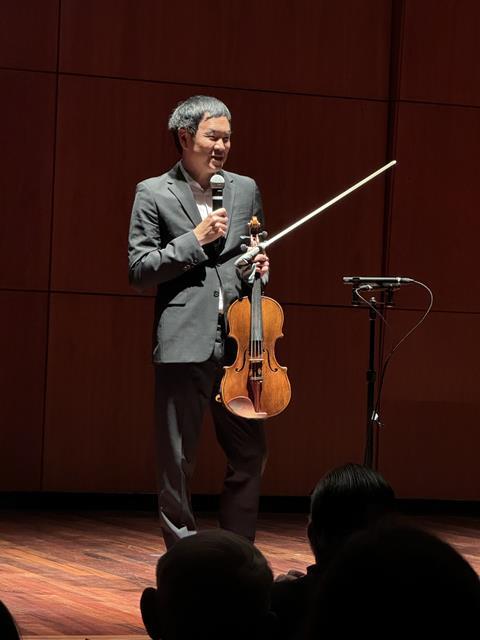 Violist Richard O’Neill at Maier Hall; photo (c) Jorge Gustavo Elias
Violist Richard O’Neill at Maier Hall; photo (c) Jorge Gustavo Elias
Garlick completed the close-knit ensemble as they closed with Ernő Dohnányi’s delightful Serenade in C major for string trio from 1902 (Op. 10) – with O’Neill again in the spotlight in the ingratiating second movement Romanze.
Watch the concert here:
Friends since childhood, O’Neill and Garlick both grew up in the area. (They used to busk on the ferry to Victoria en route to and from lessons there.) A cabin house overlooking nearby Lake Sutherland that Garlick’s family started using as a summer getaway during his childhood comfortably accommodates MOTS rehearsals.
Personal connections abound in MOTS. The cabin setting underscores the easy-going camaraderie among the musicians, who share their cooking and baking talents and take breaks to enjoy a swim or canoe ride in the lake.
I stopped by the cabin on the afternoon before Friday’s concert and had a chance to chat with Garlick and O’Neill during a break from rehearing part of the Saturday programme.
‘The natural beauty of this place really connects to the rehearsal process and the composers we work with’, Garlick said. ‘There’s a grassroots effort behind this festival. It grows from the community we grew up in and has a real sense of place. It’s not something that’s just being imported from elsewhere’.
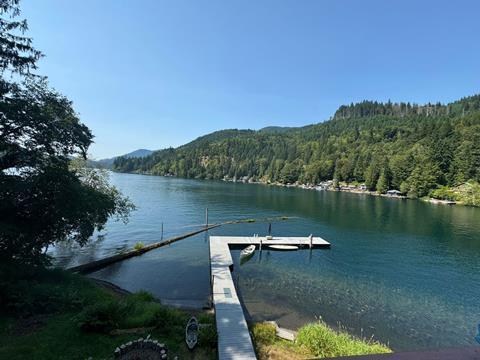 Lake Sutherland: view from the rehearsal cabin; photo (c) Jorge Gustavo Elias
Lake Sutherland: view from the rehearsal cabin; photo (c) Jorge Gustavo Elias
O’Neill told me he had reconnected with Wiancko at La Jolla Music Society’s 2023 SummerFest, when the cellist filled in for András Fejér (in an exceedingly rare cancelation by the Takács cellist caused by illness). That led to the invitation for Wiancko to appear as MOTS composer-in-residence this year.
‘It was so much fun to play quartets with Paul. We also did American Haiku, and people just loved it. Paul has a style of his own that he makes from the many different sound worlds in the piece. And he writes idiomatically in a way that makes this duo sound more than the sum of its parts. You learn so many things from working with composers.’
Garlick adds: ‘It’s a joy to bring some of the greatest musicians out to this place where we were raised and fell in love with music and to introduce them to the community. Even though MOTS is off the regular summer chamber music circuit, I think people feel a personal connection with it’.
The next day’s closing concert brought my first chance to experience Field Hall, Port Angeles’ new centre for arts and events. A game changer for the performing arts on the Olympic Peninsula, this venue opened late last summer and is perched on the waterfront, where it gazes out toward British Columbia. The bilingual street signs in this central part of Port Angeles are inscribed in English and Klallam to acknowledge the Coast Salish people indigenous to the northern Olympic Peninsula.
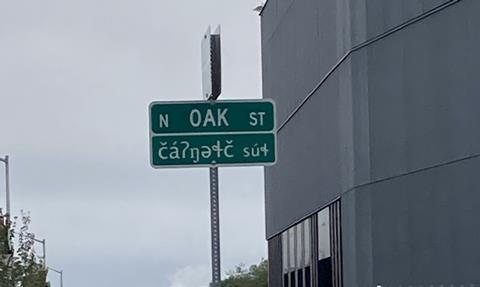
Field’s 500-seat, state-of-the-art concert hall offers MOTS leeway to bring in a wider range of audiences from across the region, including Canadians from across the Strait. (The smaller Maier Hall is perennially sold out.)
‘It feels a lot more settled now,’ remarks Garlick. ‘There’s clarity from everywhere in the house, as well as warmth, which makes it an excellent hall for chamber music’.
I got a keen sense of how connected MOTS is to the local community there. Over happy hour before the concert, a brass quintet from the Port Angeles Symphony (founded in 1932!) entertained concertgoers. A display of MOTS posters presented the work of local artists – including that of the late Jeffrey Veregge from the Port Gamble S’Klallam Tribe, whose work is featured on the 2024 poster.
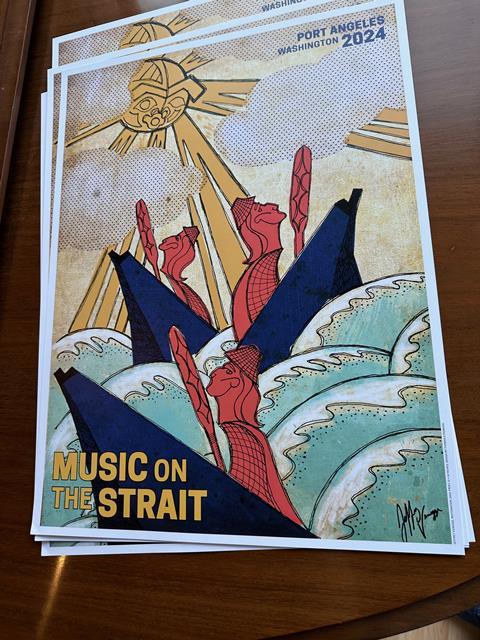
Joyce Yang (silver medalist at the 2005 Van Cliburn Piano Competition) launched the concert with an attractive set of piano miniatures: a trio of Rachmaninoff preludes and two of Tchaikovsky’s Seasons (‘June’ and ‘August’).
Judd Greenstein’s K’Zohar Harakia (2020) – a brightly lit duo for viola and cello – and Paul Wiancko’s Closed Universe (2016) represented the contemporary fare. ![]()
The latter, the work I’d heard in rehearsal the day before, is an enchantingly scored fantasy for solo cello, string trio, piano and glockenspiel. It featured Seattle Symphony principal cellist Efe Baltacıgil in the solo part, Yang at the keyboard, and Garlick, violist Ayane Kozasa and Wiancko (doubling on glockenspiel) as the string trio.
Intensifying the mood swings that comprise Dvořák’s ‘Dumky’ Trio, Garlick, Wiancko and Yang closed the concert and the festival with panache.
Listen: The Strad Podcast Episode #43: Jan Vogler on music festivals
Read: Why cellists make good marathon runners
Discover more Featured Stories like this in The Strad Playing Hub
The number one source for playing and teaching books, guides, CDs, calendars and back issues of the magazine.
In The Best of Technique you’ll discover the top playing tips of the world’s leading string players and teachers. It’s packed full of exercises for students, plus examples from the standard repertoire to show you how to integrate the technique into your playing.
The Strad’s Masterclass series brings together the finest string players with some of the greatest string works ever written. Always one of our most popular sections, Masterclass has been an invaluable aid to aspiring soloists, chamber musicians and string teachers since the 1990s.
American collector David L. Fulton amassed one of the 20th century’s finest collections of stringed instruments. This year’s calendar pays tribute to some of these priceless treasures, including Yehudi Menuhin’s celebrated ‘Lord Wilton’ Guarneri, the Carlo Bergonzi once played by Fritz Kreisler, and four instruments by Antonio Stradivari.













































No comments yet